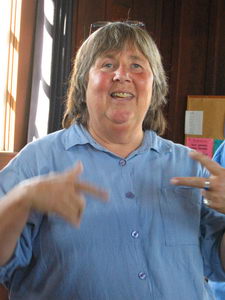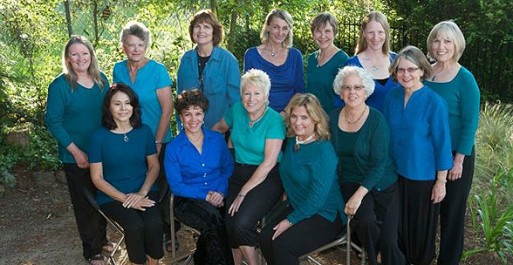Today SevenPonds speaks with Kate Munger who founded the Threshold Choir in 2000 with the idea of creating a chorus of women’s voices that could provide soothing song at people’s bedsides. She now administers a large network of of choirs nationwide, from the Northeast to the Southwest. SevenPonds spoke to Kate about the Threshold Choir’s work and the healing power of the human voice.
 Liz: Tell us a little about the Threshold Choir. How did you come up with the idea?
Liz: Tell us a little about the Threshold Choir. How did you come up with the idea?
Kate: The Threshold Choir is a network of women, primarily, who sing at the bedsides of people who are dying, people who are in a coma, newborns, children in hospitals, the grieving and incarcerated women. I started it 12 years ago, in the hills of Berkeley. I had had an experience 22 years ago singing at the bedside of a friend who was dying. It was such a profound experience that I really hoped that, and suspected that, others would like to do the same thing: to offer comfort, serenity and wisdom through simple song at bedsides.
I have been leading community singing as a sideline to all my other work for 30 years. I’ve been a massage therapist, a psychotherapist. Between 1990 and 2000, I became a public school elementary classroom music teacher, which really gave me an amazing number of skills that I’m using now every day, every minute. When I sang at my first bedside in 1990, I didn’t imagine a way to communicate with so many people spread out all over. Being introduced to the computer and the Internet supplied me the extra piece of technology to bring service to the community.
Liz: What in particular about the human voice—and specifically, the blending of women’s voices—is healing and comforting to the people you sing for?
Kate: We are welcomed with lullabies when we are first born. We’re hoping that this same kind of soft, quiet sound is comforting at the end of life. It’s also our experience that while one voice is lovely and important and a great place to start, somehow the blend of multiple voices is synergistic. That vibration is tremendously profound in our experience. It looks like it really has a strong effect on people.
Liz: Tell us about the name “Threshold Choir.” What does it signify?
Kate: The threshold of a building is the place that separates out from in. Also, the act of threshing separates the edible part of wheat or grain from the covering. So to me, this word “threshold” gives special significance to transformation. It seemed like a word that didn’t have any baggage, wasn’t pejorative nor was it way too positive. I knew when I heard it that it was the right word.
Liz: Is there great variety in the experiences you have singing at bedsides?
Kate: Sure, there are plenty of experiences. However, there is no change in the satisfaction we get from delivering this. If people want to be sung to, it is tremendously satisfying to sing to them, and it’s special to know that someone was sung to very close to the end of their life. Apparently in Judaism, it’s a very special blessing that someone should hear song or prayer, especially the shema, just before they die. I’m thinking that any song that is considered sacred—and I consider sacred any song that comes out of a human’s mouth and heart—is a big blessing to offer to the people who ask for it.
Liz: What kind of music do you sing at bedsides? Does it vary according to the person you sing for?
Kate: Over the last 12 years, Threshold Choir members who previously had never written songs before have been writing amazing songs that come out of their experiences of sitting in vigil at bedsides. We tend to sing mostly those songs at this point. Songs that are written specifically for these purposes; lyrics are very simple and clear. They’re often short, so we find ourselves singing them over and over in a hypnotic kind of way. We are available to sing whatever the client or family might like to hear, in terms of hymns, spirituals, soft pop songs from bygone eras, the occasional Beatles song. We are women for whom singing has been a profound gift, so it’s our joy to give back in that format, where our singing is our gratitude for that gift.
Liz: You have said that in a way, you are also singing for the families of the person who is dying.
Kate: I feel that goes back to our tribal nature. A thousand years ago, if a tribal member was in trouble or hurting, we would gather as a tribe and sing for them. If a tribal member was dying, we would gather in circle and sing in their honor and memory, and sing our prayers to their safe passage. I feel it’s a very old-fashioned idea, but for us in the 21st century it can also have a strong impact on people’s expression of grief. It can accompany the normal grief combined with awe that happens when we’re at the bedside of someone who has lived a long and productive life, and is lucky enough to die at home with loved ones around them. We think that’s a very special occurrence.
Liz: What words of advice do you have for people dealing with end-of-life issues?
Kate: I would urge people for whom impending death is a reality, either for them or for a loved one, to focus on being with that person, not necessarily doing with that person. There’s lots of other ways besides singing to actually be with someone who is struggling with end-of-life issues. I would say spend the time, rather than cook the casseroles or do other things. Stop bustling around, and sit by the person’s bedside and tell them you love them.
And I would also urge people to sing. This is not the exclusive realm of people who call themselves singers. I believe that all of us can sing, and all of us should use this very special human skill even if we’re not the best singers in the world. We call our work “kindness made audible,” and that it has grown to this extent in such a short time, to me is really good news in the face of so much of the bad news we live amongst in the 21st century. To me, it’s heartening, it’s positive; and I’m very proud of the Threshold Choir. The gals that go to bedsides are my heroes.
Liz: Thank you, Kate, for taking the time to speak with us!
If you are interested in getting involved with a Threshold Choir chapter near you, visit the website or email Kate at kate@thresholdchoir.org.
Visit lyrics on SevenPonds of:

 What is the Threshold Choir? An Interview with Kate Munger
What is the Threshold Choir? An Interview with Kate Munger



 “Help Me, Helen”
“Help Me, Helen”
 Recovering Cremation Remains After the Los Angeles Fires
Recovering Cremation Remains After the Los Angeles Fires
 “As Tears Go By” by Marianne Faithfull
“As Tears Go By” by Marianne Faithfull














